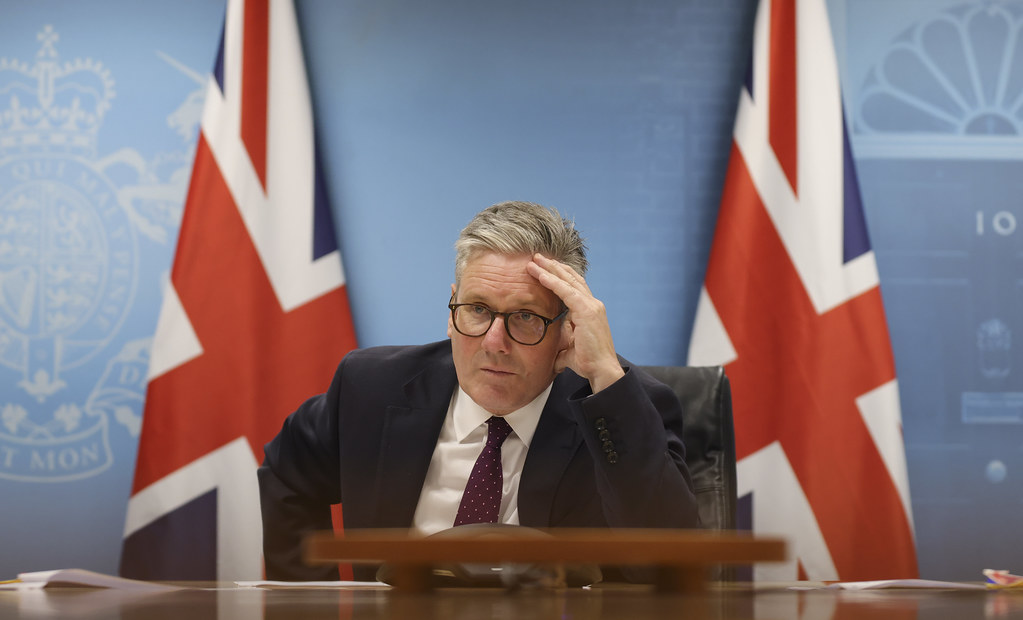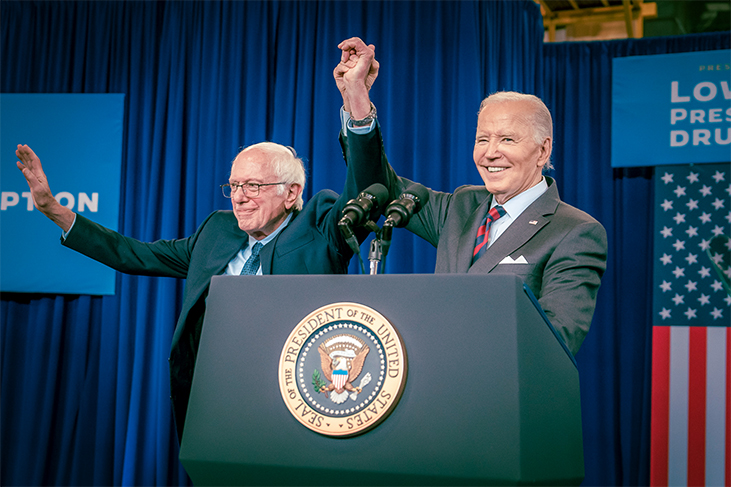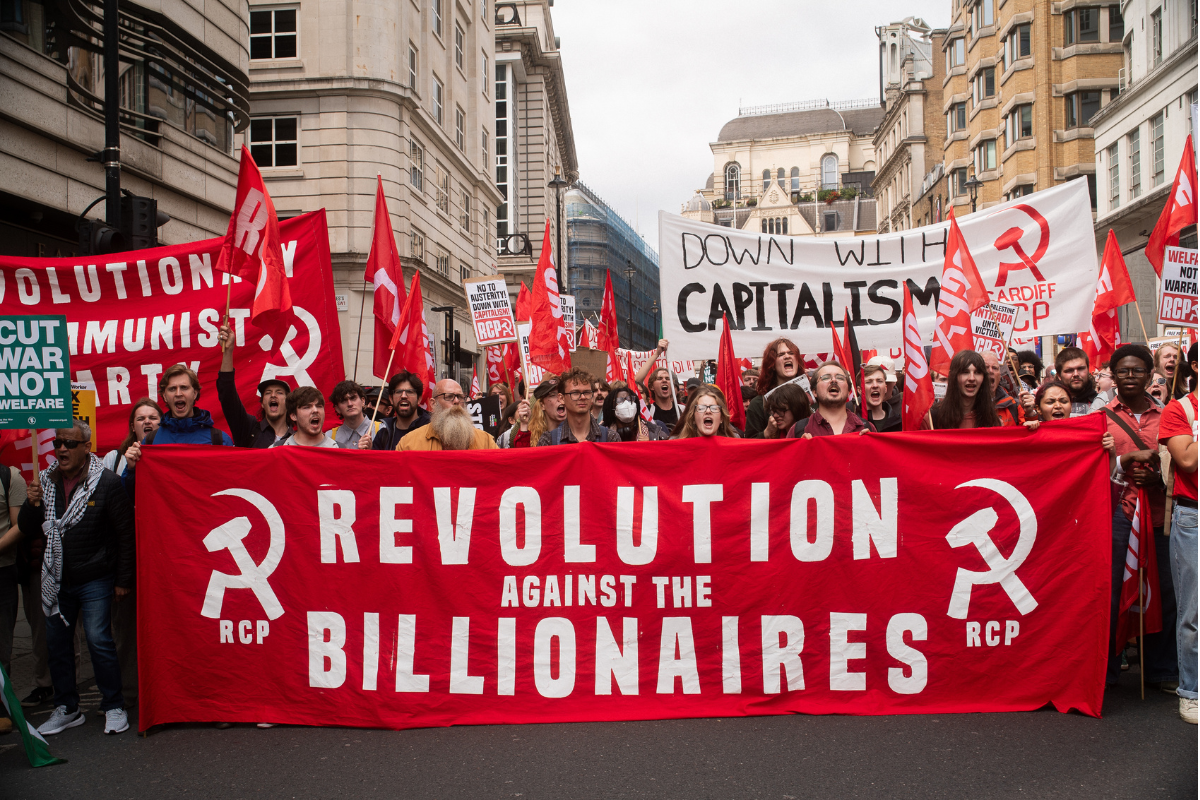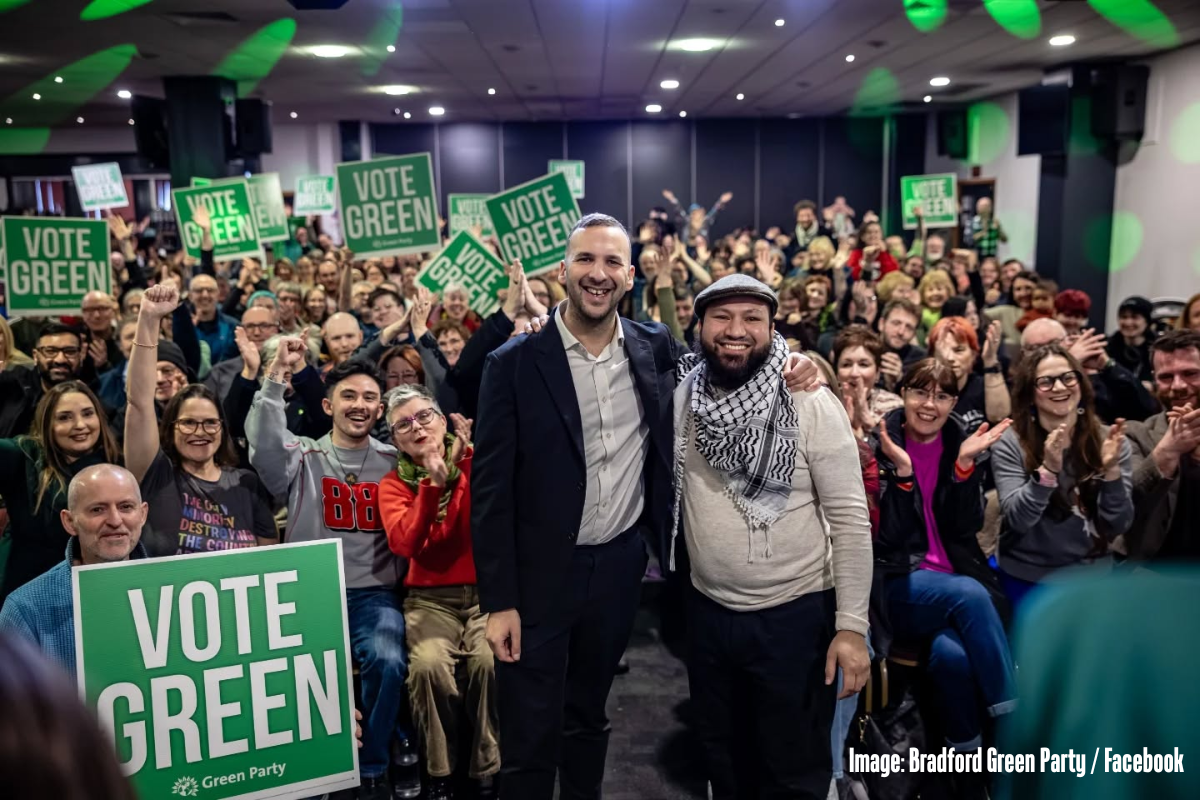Later this month, on Wednesday 26 November, Chancellor Rachel Reeves will deliver the government’s latest Autumn Budget. With estimates of a £30 billion ‘black hole’ in the public finances, Reeves is set to announce yet another barrage of attacks on the working class.
The budgetary dilemma facing the Labour leaders is a reflection of the acute crisis of British capitalism.
Despite much talk from Downing Street about ‘turbocharging growth’, the UK economy is stuck in the doldrums. Inward investment is paltry. Inflation is persistent, with rents, bills, and supermarket prices continuing to rise for ordinary families. And public services remain dilapidated, deteriorating further with every passing day.

Keir Starmer and his government can expect no help from beyond Britain’s borders either. With both private and public debt at eye-watering levels, and protectionism on the rise, the world economy increasingly resembles a house of cards, ready to collapse at any point.
No wonder ‘bond vigilantes’ – the bankers and billionaires – are circling like vultures above the heads of governments everywhere, ready to swoop in and pick at any vulnerable economy.
And with British capitalism and its representatives in dire straits, it seems that these parasites currently have the UK firmly in their sights.
Burning anger
This neverending crisis, at root, is what is fuelling the burning anger towards the entire capitalist establishment.
From the bankers and landlords, to the police and politicians, to the country’s royal reprobates: every pillar of the British establishment is rightly despised.
While the mega-rich get ever richer, and the elites in Westminster and Windsor embroil themselves in criminal corruption and debauchery, the rest of us are forced to suffer the consequences of capitalism’s chaos.
All that these cretins and their system have to offer is cuts and conflict; instability and insecurity; militarism and flag-waving; exploitation and oppression. No wonder they are so hated.
Resentment and rage
Until recently, there was no real political outlet for all of this resentment and rage against the establishment.
Instead, reactionary demagogues and charlatans like Nigel Farage and Tommy Robinson have been the main beneficiaries of the discontent towards the status quo, gaining support by whipping up tensions over migration.
At the same time, the question of Palestine has become a lightning rod for all the accumulated anger in society, with millions of workers and youth taking to the streets over the past two years in protest against the genocide in Gaza, and the complicity of ‘our’ bloodsoaked imperialist government.
On the electoral front, meanwhile, Britain’s traditional political duopoly of the Tories and Labour have been given a kicking by voters at every available opportunity.
The result is an increasingly polarised and fractured political landscape – as seen most recently with Plaid Cymru’s victory in the former Labour stronghold of Caerphilly, in a by-election for the Welsh devolved parliament.
Powerful expressions
In one country after another, however, like bolts from a clear blue sky, we are beginning to see powerful expressions of the charged, radicalised mood against the existing order and its upholders.
From Nepal and Peru, through to Madagascar and Morocco: a youthful wave of revolution and rebellion is spreading across the planet, sweeping rotten regimes from power.
Across Europe last month, meanwhile, workers and youth came out en masse in solidarity with the Palestinian people. This included an inspiring two-million-strong general strike in Italy on 3 October to ‘block everything’ for Gaza.

And on either side of the Atlantic, left-wing candidates are giving the establishment a scare – whether it be Democratic Socialist Zohran Mamdani in New York, or newly-elected President Catherine Connolly in Ireland.
At the same time, all the mainstream parties of the so-called ‘centre ground’ are in disarray. Whether it be liberalism, populism, or social democracy: any political party that bases itself on capitalism is drowning along with this sinking system.
Green surge
For years in Britain, since the demise of the Corbyn movement round one, there has been a notable political vacuum on the left. Now, however, like London buses, two left-wing electoral alternatives have suddenly arrived on the scene at once.
This summer, after dragging their feet for months, Jeremy Corbyn and Zarah Sultana finally announced plans to establish a new left party.
The enthusiasm towards this initiative was clear from the outset, with over 700,000 signing up in interest within days. But instead of channelling this energy by organising mass rallies and laying out a bold socialist programme, the ‘Your Party’ leaders squabbled amongst themselves, leading to frustrations and disinterest amongst activists.
Running parallel to this shambles has been the surge towards the Green Party, thanks to the radical policies and strident tone presented by new leader (and self-proclaimed ‘eco-populist’) Zack Polanski.
Consequently, the Greens have soaked up much of the support that could have potentially been captured by Corbyn and Sultana. This has propelled the Green Party’s membership upwards of 150,000: more than double the number prior to Polanski’s election, and larger than both the Lib Dems and Tories.
View this post on Instagram
Similarly, according to some recent surveys, the Greens are now second in the polls – behind Farage’s Reform UK, but ahead of Starmer’s Labour and the rest.
Amongst young people, meanwhile, the Greens are well out ahead, with 39 percent of 18-24 year-olds stating that they would vote for Polanski’s party at the next general election.
View this post on Instagram
Anti-establishment vibes
There are some differences between Zack Polanski and Zarah Sultana, in terms of the language they use and the demands they put forward.
In reality, however, there is far more that unites these left figures than separates them.
Whether it be Polanski and Sultana in Britain, or Mamdani in the USA: those spearheading this new left revival are all partial expressions of the radicalisation within society; of the transformations that have taken place within the minds of the masses, under the hammer blow of events.
That is the essence of the matter. As with the vote for George Galloway – or for Jeremy Corbyn and Bernie Sanders in the past, or indeed for Donald Trump and his populist ilk more recently – ordinary voters are desperately searching for some kind of alternative to the loathsome political establishment, wherever they can find it.
The support for Polanski, Sultana, and Mamdani, in this respect, is less about specific statements they have made or policies they push, and more about the ‘vibe’ they give off: the anti-establishment, anti-billionaire image they project.
Their recent rise, in turn, is the mirror image to that of Farage and Trump; part of the same process of polarisation and radicalisation that is taking place everywhere, as the crisis of capitalism plunges the ‘centre ground’ into chaos.
Radical rhetoric
At the same time, Polanski, Sultana, and Mamdani are also united in their politics.
They may come across as radical, especially compared to what else (if anything) is on offer on the ‘left’. But all of them, at root, are cut from the same reformist cloth – believing that genuine change in the interests of working people can be brought about within the confines of capitalism.
Occasionally they hit the headlines and ruffle the feathers of the elites with certain bold demands. Polanski, for example, has said that the Greens would “abolish landlords” if in power. Sultana, meanwhile, has called for Britain to “abolish the monarchy” and “withdraw from NATO”, which she rightly describes as an “imperialist war machine”.
Prince Andrew’s titles have been removed.
Good start — now let’s do the rest of them and abolish the monarchy.
— Zarah Sultana MP (@zarahsultana) October 30, 2025
NATO isn’t about “peace” or “security”. It’s an imperialist war machine. Just look at Afghanistan and Libya.
Arms dealers profit while our NHS collapses, public services crumble and millions of children grow up in poverty.
We must withdraw from NATO immediately.
People don’t…
— Zarah Sultana MP (@zarahsultana) October 28, 2025
And both have come out forcefully against the establishment’s culture war, in support of migrants and refugees, and in favour of nationalising Britain’s utilities and transport networks.
Notably, speaking at ‘Your Party’ rallies, Zarah Sultana has outflanked co-founder Corbyn to the left, even going so far as to talk about the limits of calls to ‘tax the rich’, and stressing the need for “workers’ control over the means of production”.
But all of this amounts to little more than rhetoric and platitudes unless it is based on a serious, militant programme, aimed at upending the capitalist system and carrying out a root-and-branch transformation of society.
Vague and utopian
At the end of the day, Polanski, Sultana, and Mamdani are all individual ‘influencers’, picking up and putting out an eclectic array of slogans and demands, without any coherent underlying or guiding analysis.
In every instance, their policies are purposefully vague and woolly: seemingly radical on the surface, but soft and utopian in regards to any substance or concrete suggestions.
More often than not, they are not attacking capitalism and the dictatorship of the billionaires, but only opposing ‘neoliberalism’; calling for greater regulation and redistribution; in short, appealing for a meat-eating tiger to be convinced of the merits of vegetarianism.
Likewise, they have no strategy for bringing about their proposals. Speaking to BBC Radio 4 recently, for example, Sultana talked about her political vision being a “40-year project” aimed at “running government” – hardly a call to arms for the organised working class to overturn capitalism’s rotten status quo.
Betrayals of reformism
Such left figures are no doubt well-meaning and sincere. But, as the old saying goes, the road to hell is paved with good intentions.
Corbyn and Sanders also came across as a breath of fresh air when they exploded onto the political stage in Britain and the USA, respectively, a decade ago. The former promised to take on big business and “overturn the rigged system”. The latter even called for a “political revolution against the billionaire class”.

Yet all of this was ultimately hollow, with the movements behind Corbyn and Sanders ending in disappointment and defeat, due to their retreats and capitulations.
Similarly, Pablo Iglesias of Podemos in Spain and Alexis Tsipras of Syriza in Greece also used very bold, radical language initially. But this meant little when push came to shove. Podemos ended up supporting the anti-worker programme of Sanchez’s government. And Syriza, elected on a pledge to reject austerity, agreed to the Troika’s brutal demands.
The lessons of these experiences should be etched on the foreheads of every left-winger, as a reminder of Leon Trotsky’s conclusion: betrayal is inherent within reformism.
This has nothing to do with the personal qualities of the left leaders, or lack thereof, but stems from the logic of accepting capitalism.
Need for revolution
The real difference, therefore, is not between various shades of left reformism, but between reformism and revolution.
The communists will support these left-wingers in every positive step they take; in every struggle against the billionaires, landlords, and the rest of the capitalist establishment.

At the same time, we maintain our own independent banner: our Marxist perspective; our socialist, internationalist, class-based programme; our revolutionary party.
Only on this basis – with a revolutionary communist perspective, programme, and party – can we bring about a fundamental transformation in society: leading the working class to power; overthrowing the profit system; and planning the economy in the interests of the many, not the few.
In truth, many of those who support Polanski and Sultana are already looking beyond their reformism, towards communism and revolution.
According to recent surveys, for example, almost a third of 18-24 year-olds in Britain have a positive view of communism. Amongst 25-34 year-olds, this figure rises to 40 percent. Almost half of young people in Britain, meanwhile, say that they want a revolution.
To those drawing revolutionary conclusions, we say: it’s time to get organised. It’s time to struggle. It’s time to join the communists.






